- Home
- Robert Graves
They Hanged My Saintly Billy Page 10
They Hanged My Saintly Billy Read online
Page 10
'You may say good-bye now, my girl,' said Mr Dawson.
'Papa, may I kiss my friend?' she pleaded.
'No, you may not!' came Mr Dawson's gruff reply.
William, looking very sulky, said to Annie: 'Very well, then; let's leave it at that, my dear! I had thought better of you. Good-bye!'
He did not deign to take his leave of Mr Dawson; but turned his back and strode away towards the park gates.
The above account was given by Mrs Remington of Rugeley, at whose cottage William Palmer lodged on his return from London, to avoid a clash with his brothers George and Walter, then staying at The Yard. Mrs Remington is a frail old body with a pink, unlined face and the whitest of hair, who dresses in a fashion that had been no longer new in the year of Trafalgar. She heard the tale from William Palmer's own lips, and declares that love for Annie Brookes was the greatest thing in his life and that, though he may have been a wild young scamp before, he now decided to reform for her sake.
We then questioned Mrs Remington about his bad behaviour at Stafford Infirmary.
MRS REMINGTON
Ah, that was just it! Annie's refusal to offer him any sure hope of marriage so cast him down, and conditions in the wards were so shocking, that he does seem to have behaved pretty ill. However, he and she continued to correspond secretly, and he pressed his suit with such fervour, representing himself as a lost soul who would go straight to the Devil unless she held out a hand to rescue him, that Annie at last gave in. But this was conditional on his working hard, gaining his diploma, and loving no other woman beside herself—as she would love no other man. And they both kept their word, you may be sure! Whilst at my cottage, which was nearly a twelvemonth, Dr Palmer was as good a young fellow as ever walked. 'I'll marry that girl,' he used to say to me, 'or know the reason why!'
Only the other day I came across some of his letters, left behind in a drawer when he went off, and here they are. The first is from her to him, immediately after that sad scene in Bagot's Park:
Tuesday
My own dear William:
Why did you sulk when you bade me good-bye in the park this morning? Mr Dawson is always very kind to me, and I should ill requite his goodness by acting directly contrary to his wishes. Come, put on one of your best smiles and write me a real sunshiny note, for you have made me very unhappy. I shall expect a letter on Thursday.
Ever yours, Dearest,
Annie Brookes
He always wrote to her, at this time, in care of Mr Dawson's gardener; and made it very much worth the man's while. This next letter was sent him in London, about a month before he gained his diploma:
Abbot's Bromley, Sept. 13, 1846 9 a.m.
Dearest William,
I think it was your turn to write, and I fancy that if you will only try and recollect you will think so too. But never mind, although I have not written, you know quite well that I am always thinking of you.
Mr Dawson went to London on Monday last and yesterday Miss Salt came over to see us. We gathered ferns together. I hope you will continue your botanical studies, and allow me the opportunity of puzzling you. I have two secrets to tell you, but these I must reserve for Saturday. I don't mind telling you that I think it is your friend Masters who is trying to prejudice Dr Knight. Miss Salt says she knows it is that very crabbed gentleman—whom, of course, you will now love dearer than ever.
I have got a present for you, but as it is intended as a surprise, I must not spoil it by telling you what it is. Suppose, instead, that I tell you something you will not care to hear half so well, namely that I am ever, my very dearest William,
Your affectionate
Annie
The present she gave him was a pair of bed-socks knitted in scarlet wool, because he had complained of the coldness of his bed. What the other two secrets were, I'm sure I don't know.
Then here's a letter which he wrote, but never sent. Perhaps it's what he called a 'trial gallop'. He used to write his letters at night, then sleep on them, and polish them up in the morning. This one is dated 'Rugeley, May 16th', of the next year, which was the very day he had hopefully fixed for their marriage. He asked me once when my own wedding-day had been. 'May 16th,' I answered. 'Well, then, Mamma,' he said—he always called me 'Mamma'—'it shall be mine, too.' But though Annie Brookes had given him her solemn promise, and informed Mr Dawson that she was satisfied as to the young man's reformation, both Mr Dawson and Dr Knight still strongly opposed the union. It was only because of Mr Weaver's writing to the Court of Chancery on her behalf, and vouching for Dr Palmer's respectability, as being now a qualified surgeon and a man of substance, that the Lord Chancellor made out an order permitting the marriage. It was to take place in the September of that year, when Annie turned eighteen; or sooner, if her guardians would let her. Here, read this:
Rugeley, May 16th, 1847
My Dear Little Annie,
It was not the rain that prevented me from joining you at Stafford, as you wished. I sprained my foot and it was so painful that I could not keep it on the ground. I slid off the pathway as I was turning the corner of The Yard, past Bonney's. Now you know the reason, I am sure you will forgive me.
Oh, Annie! You cannot tell how dull I have found the last few days; I sit and think over my miserable bachelor life, and feel so dull and lonesome, I really cannot explain. I resolved, yesterday, to write again to Mr Dawson, but you forbid me doing this, so I must wait the other four months. My dear Annie, I cannot tell you how much I love you, and how I long to call you mine for ever.
Yours most affectionately, W.P.
P.S. Did Dr Knight get the game I sent? Did he mention anything about it?
There's no more letters, Sir, but when he left this cottage on the occasion of his marriage—the wedding dinner was provided for forty at Abbot's Bromley, and he invited my husband and me—
Dr Palmer declared that he had spent the happiest days of his life in my cottage. I felt rather hurt when I found my rooms let by him to a friend of his without my consent; but he says: 'Never mind, Mamma, I have let them to a very respectable man, and have got you two shillings a week more rent. I'm sure you deserve it, you're so very kind.'
He had leased a nice house from Lord Litchfield. You'll find it immediately opposite The Talbot Arms Hotel—he chose the situation, I dunk, to spite Mr Tom Masters, the landlord; and there, at the entrance, he set up his brass plate. I should have mentioned that, while lodging with me, he worked regularly at his profession, helping old Dr Bamford, the Palmers' family physician, with patients who lived in remote farms and hamlets. That gave him good experience for, as he used to say: 'A diploma's not everything. Dr Bamford may have no diploma nor medical degree, but experience he has, and that's what counts in doctoring.' I dunk that Dr Bamford, who had always liked Master William, came to feci great gratitude for him, especially as he demanded no fee for his assistance, but only out-of-pocket expenses.
No, there's little more to tell you, except that one night he came home intoxicated from a party.' Mamma,' he said,' I'm very ill. But it's not that I drank a deal of wine: as you know, I'm very abstemious. Someone seems to have played a trick on me, by drugging my drink. Serves me right for doing the same, as a lark, once or twice last year when I was at Stafford.' He began telling me of his love for Annie Brookes, right poetical he was, too. Then suddenly he stops and says: 'I'll tell you the truth, Mamma, because you're so good and truthful yourself. One of the reasons I love Annie is that she's like a sweet, pure lily-of-the-valley sprung from black, stinking mud. Her father was a poor coward, the laughing-stock of Stafford, and a suicide; her mother a greedy, spiteful, foul-mouthed strumpet, from whom she had to be rescued by the Court of Chancery. If Annie can be virtuous and hold up her head despite all the misfortunes of her birth—for you know, Mamma, that she's illegitimate into the bargain—why, then so can I! Need I drag out my own family history, Mamma? Surely you'll know it, including the dirty new scandals which my mother's behaviour has caused in the town.
You'll have heard of them, no doubt?'
I nodded sadly, for everyone said that, to begin with, Dr Palmer's real father, like the elder brother's, was Hodson, the Marquess of Anglesey's steward, to whom his mother had been leased in return for a few loads of stolen timber.
"Well,' he goes on, 'Mr Weaver did very wisely when he sponsored the match. Annie and I are birds of a feather, and neither of us can cast faults of parentage in the other's teeth. Together, we'll make a clean new home, and raise healthy children, and live in love and truth until death do us part.'
His words were so beautiful that I hugged him to me, and called him my poor lamb.
Chapter VIII
THE NURSERY
WHEN Dr Palmer married Annie Brookes on October 7th, 1847, he could count himself tolerably well off. His house, rented at only twenty-five pounds a year, was furnished with elegance; he had a handsome carriage for going his rounds, and although three or four surgeons were already practising in Rugeley, the town boasts four thousand five hundred inhabitants, and the outlying villages another couple of thousand. Consequently Dr Palmer did not lack for patients; indeed, he made quite a reputation, during the December Fair that year, from his skilful setting of broken bones, and soon had more work in hand than pleased him. Benjamin Thirlby was employed at this time by Dr Salt, Rugeley's leading surgeon, to make up medicines and dress wounds; and two years before this had opened the chemist's shop already mentioned in our sketch of the town. One day, according to the account most usually heard, Thirlby felt aggrieved because Dr Salt had reprimanded him sharply for an oversight in the matter of some prescription, and poured out his woes to Dr Palmer when he next visited the shop.
' Nay, Ben,' said Dr Palmer,' this trouble is soon remedied: why don't you cut your stick and come to me? I'll pay you better than Salt.'
'I'll come with all my heart,' cried Thirlby, still very angry. 'The nineteen years I worked for that ill-mannered old skinflint have been nineteen too many!'
Dr Palmer stretched out his hand for Thirlby's, to shake on the bargain; and Thirlby grasped it firmly.
Dr Salt, though often grumbling of his assistant's pigheadedness, never expected him to break his engagement, however harshly he might be scolded. But Mrs Thirlby now informed him —for Thirlby himself hid his shame under a mask of surliness, and turned to walk in the opposite direction whenever he saw Dr Salt approaching—that Dr Palmer had offered her husband twenty pounds a year more than his former wage. The news made Dr Salt very angry indeed. That a surgeon should entice away another's assistant is considered as grave a breach of professional etiquette, as when a gentleman steals his neighbour's French cook, or a minister of religion poaches for souls in a fellow-minister's congregation. Dr Salt, who was much respected locally, did not scruple to complain in public of Thirlby's ingratitude and Dr Palmer's ill-manners, and earned a deal of sympathy; Rugeley being a town where sharp practice has never been condoned as a good joke, as it so often is in Liverpool and London.
Miss Salt, Dr Salt's daughter and Annie Palmer's closest friend, when she called the next day as usual, explained how difficult her situation had become as a result of Thirlby's sudden change of employment.
' Oh, but my dear child,' cried Annie, 'I'm afraid you have been given quite the wrong notion. William told me all about Thirlby as soon as he came home. It appears that your father scolded Thirlby because he had forgotten to prepare some pills, and when he pleaded that the prescription was written so illegibly that it would have been dangerous to guess at its meaning, your father called him a bleary-eyed clodhopper and dismissed him on the spot. William, happening to pass by, found Mrs Thirlby in a flood of tears, and kindly told her not to despair—Thirlby should first make sure that the dismissal was final, and if so, come to work with himself. She sent Thirlby off to try at the surgery whether vour father might perhaps relent, but he soon returned, saying: ' Dr Salt swears that he never goes back on a dismissal. I'll come to you, Will, if I may." As you see, Will is not in the least to blame.'
Miss Salt naturally concluded that Thirlby had been lying to Dr Palmer. She told her father so, but he merely remarked 'Humph!', and never troubled to inquire into the matter; though when Dr Palmer offered him neither an apology nor an explanation, he cut him dead one morning in the Market Square.
Dr Salt did not forbid his family to continue their friendly relations with the Palmers. He knew that Miss Salt had been Annie Palmer's bridesmaid at the wedding and loved her dearly; and that his son Edwin thought highly of Dr Palmer. 'It takes all sorts to make a world,' he would say in sour tones that showed his ill opinion of a world so made; but he was kind enough not to involve his children in the quarrel.
Annie Palmer grieved to think that Dr Salt had taken an aversion to her beloved husband. She had inherited a tendency to melancholia from her father and, though hitherto the fits had been slight and short-lasting, some drunken talk she now overheard from the tap-room of The Talbot Arms Hotel across the street, about her husband's escapades at Stafford Infirmary, plunged her into a black misery. Yet Dr Palmer was tenderness itself, and did all in his power to cheer Annie up, attributing these moods to her condition; for she had found herself pregnant after three months of marriage. He bought her a chaise and a beautiful pair of ponies to drive about the country with, and she used to tell Miss Salt: 'I really can't explain these black fits, unless Will is right in saying that they're due to my baby, for you know I'm very happy indeed. I have all that heart could desire, or that money can buy. And to be a mother is a glorious thing!'
When at last he begged to be taken into Annie's confidence, it came out that guilt was gnawing at her conscience. By order of the Court of Chancery she had been separated from her mother, whom the Bible required that she should honour, and had never asked leave to be reunited with her. 'Mr Dawson and Dr Knight,' Annie told him, 'both spoke unkindly of my mother, and I dared not oppose them. Neither have I dared to mention the matter to you. But I should think very ill of myself if I didn't long wholeheartedly to see her again. I can't pretend that I have pleasant memories of her, but perhaps I was a difficult and disagreeable child. If so, I should like to do better now and make her love me again; as she must have done once. All mothers dote on their children until some little thing turns up to disappoint them. What if I died in childbirth? Would that not be God's punishment on me for not having insisted on visiting her while I yet could?'
It speaks exceedingly well for Dr Palmer that though he had heard the whole story of Colonel Brookes and Mary Ann Thornton from Mr Weaver, if from nobody else, he decided to humour his wife. Mrs Thornton, by this time a haggard and prematurely aged eccentric, still occupied the house behind St Mary's Church, Stafford, where Colonel Brookes had died and Annie had been born. She kept no servants, seldom appeared in the street except on her brief visits to shops, and lived among a swarm of cats with which she held prolonged and one-sided conversations about subjects certainly well above their heads.
Mrs Thornton would not at first open the front door to the elegant young couple who came calling in their chaise-and-pair; but when Annie had made herself known, through the keyhole, she unlocked the door hastily and, with tears coursing down her dirty cheeks, sobbed out: 'My little love . . . My own lost darling!'
Annie timidly asked her mother not to squeeze her quite so hard because she hoped, within a few months' time, to become a mother herself.
' At last I have something to live for!' Mrs Thornton exclaimed, raining alcoholic kisses on Annie's face. She promised to put the house in better order for a next visit which, she hoped, would take place as soon as possible. Dr Palmer showed great attention to the poor creature, even bringing himself to address her as 'Mamma'; and Annie returned home deeply grateful for his kindness and understanding.
She was very religious, and persuaded her husband to be the same. They regularly attended the new church of St Augustine's, near The Yard, which is kept up in style, with gravelled walks and turf well-swept and trimmed. (The old Parish Ch
urch, on the other hand, is a mere Gothic ruin. Its square tower has empty holes for windows, like the eye-sockets of a skull, and is swathed with tattered ivy. Its chancel, roofed in with boards and tarpaulin, has been turned into a Sunday School.) Enter the new church by the great oaken door, and the swinging inner doors faced with red baize, as new and bright as a postman's coat in May, and you will find the Palmers' pew well to the fore. Black-bound prayer books and Bibles with* gilt edges rest on its ledge, and the fly-leaf of a Book of Common Prayer is inscribed: William Palmer, Rugeley, Aug. 28, 1837; the gift of his mother, Mrs Sarah Palmer, Rugeley. A Bible contains some pencil notes in Dr Palmer's handwriting: He was a teacher come from God—Means, Prayer—God's word all the means of grace—Particularly means, faith in Christ—Faith has a heavenly influence. The interior of the church is newly whitewashed, and flooded with light streaming in cleanly through diamond-paned windows; but a huge red curtain casts a warm glow upon the sides of a polished, goblet-shaped pulpit. Dr Palmer is said to have been exceedingly attentive to the sermons, and the only member of the congregation who took notes; he would also read the responses louder than anyone else and give generously to all charities.
A rumour, almost certainly unfounded, had of late coupled his name with that of Mrs Salt, Dr Salt's daughter-in-law, whom he was treating for some female ailment; and this, added to Dr Salt's opinion of him, caused a decided shrinkage in the flow of patients. But he did not care, being already tired of medical work. The following letter to his wife, which has come into our hands, must have been written from Rugeley about this time, when she had gone for a change of air to stay with Mr Edwin Salt and his wife some fourteen miles away.

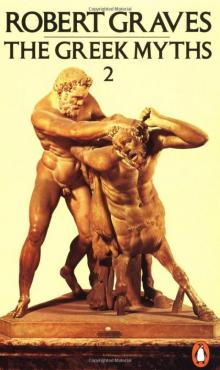 The Greek Myths, Volume2
The Greek Myths, Volume2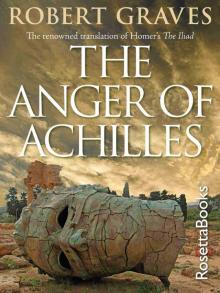 The Anger of Achilles: Homer's Iliad
The Anger of Achilles: Homer's Iliad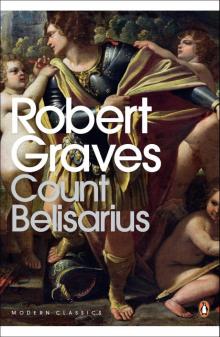 Count Belisarius
Count Belisarius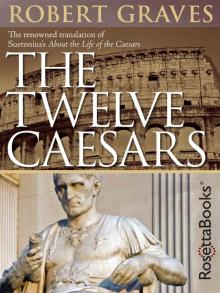 The Twelve Caesars
The Twelve Caesars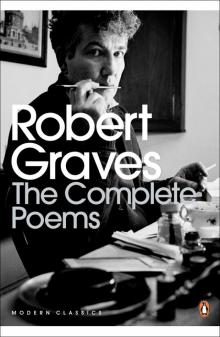 Complete Poems 3 (Robert Graves Programme)
Complete Poems 3 (Robert Graves Programme) Homer's Daughter
Homer's Daughter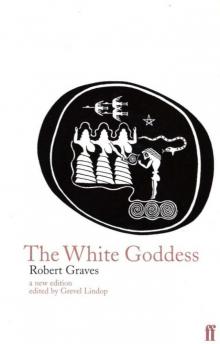 The White Goddess
The White Goddess Goodbye to All That
Goodbye to All That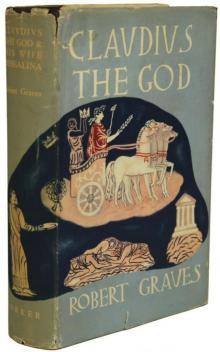 Claudius the God and His Wife Messalina
Claudius the God and His Wife Messalina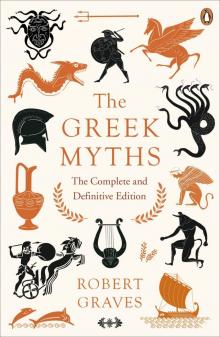 The Greek Myths
The Greek Myths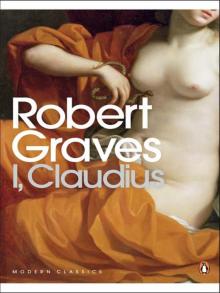 I, Claudius
I, Claudius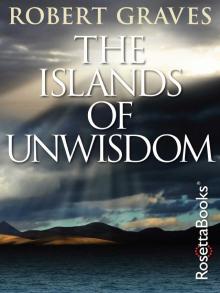 The Islands of Unwisdom
The Islands of Unwisdom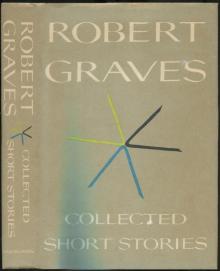 Complete Short Stories
Complete Short Stories The Golden Fleece
The Golden Fleece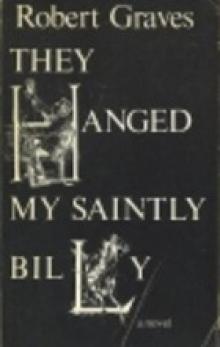 They Hanged My Saintly Billy
They Hanged My Saintly Billy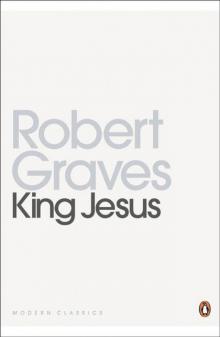 King Jesus
King Jesus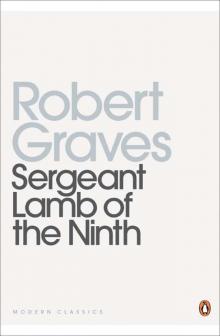 Sergeant Lamb's America
Sergeant Lamb's America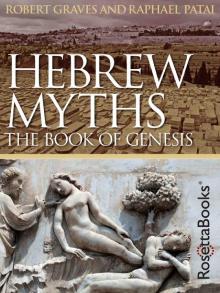 Hebrew Myths: The Book of Genesis
Hebrew Myths: The Book of Genesis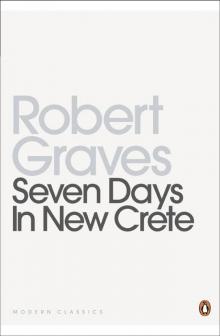 Seven Days in New Crete
Seven Days in New Crete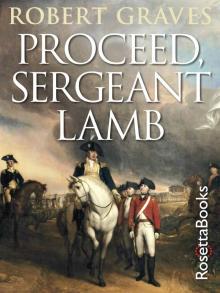 Proceed, Sergeant Lamb
Proceed, Sergeant Lamb Claudius the God
Claudius the God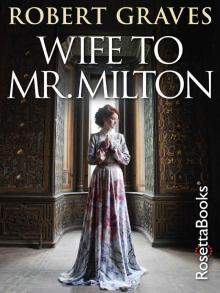 Wife to Mr. Milton
Wife to Mr. Milton The Complete Poems
The Complete Poems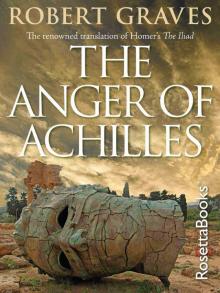 The Anger of Achilles
The Anger of Achilles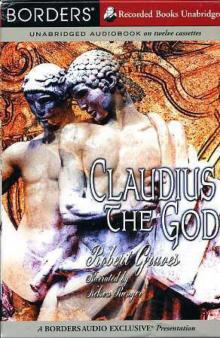 Claudius the God c-2
Claudius the God c-2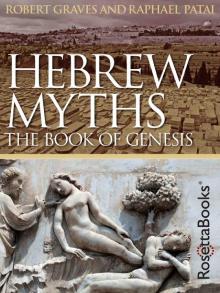 Hebrew Myths
Hebrew Myths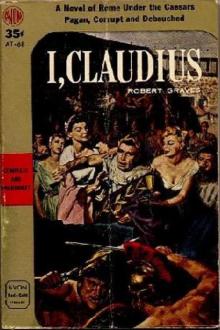 I, Claudius c-1
I, Claudius c-1 The Greek Myths, Volume 1
The Greek Myths, Volume 1